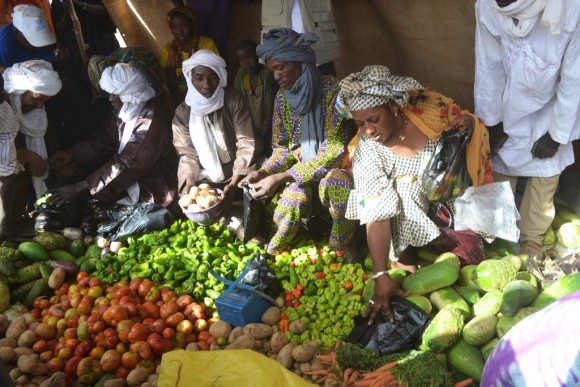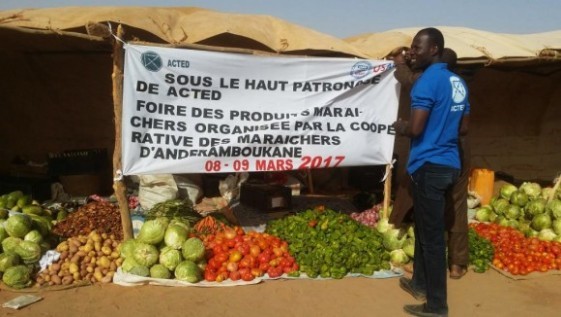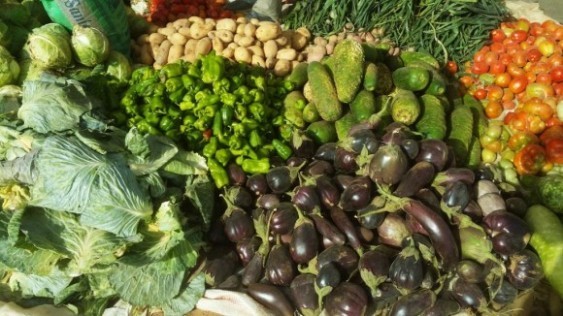Promoting market gardening, or how an agricultural cooperative with 81 members managed to produce over 170,000 kilos of vegetables.
ACTED has been working for two years with support from OFDA in the Gao and Menaka regions to tackle the effects of the crisis in the North of the country and the impacts of climate change on vulnerable populations.
Supporting livelihoods against food insecurity
As a consequence of the droughts and the difficult Sahelian climate conditions, coupled with the significant population displacements inside Mali and beyond the borders following the political and security crisis that hits the North of the country since 2012, food insecurity continues to rage in the Gao and Menaka regions, particularly affecting vulnerable families, returnees and displaced people.
Since 2015, ACTED’s interventions focus on restoring and consolidating their livelihoods to tackle food insecurity. Fishermen, farmers and vegetable producers are supported through activities aiming at recapitalising their equipment and reinforcing their capacities, while receiving seeds and tools. Herders and stockbreeders are supported through cattle feed distributions, and assistance to veterinary services is done by organising vaccination and deworming campaigns.

A potential future in market gardening
In February 2016, ACTED organised agricultural trainings with 100 participants, including Thyko, who used to be a refugee in Niger, and now lives in Anderamboukane, North Mali, with his wife and their four children. He describes how the agricultural training had positive impacts for him: “A training about market gardening practices was organised here in Anderamboukane, including how to grow market garden products and prepare vegetable nurseries, organic fertilization and composting techniques, and how to produce natural pesticides against pests.”
It helped me understand that market gardening activities are possible also without utilising chemical fertilisers and pesticides. It also made me understand that we have all we need here to recycle domestic and any type of green waste to produce our own fertilisers.
“We can use local products such as peppers, garlic or tobacco to produce natural fertilisers instead of using chemical products, which are not eco-friendly, beyond their very expensive price for farmers.” Thyko also received seeds and the necessary ploughing equipment to start market gardening activities.

After participating in the training, Thyko decided to go beyond his own activity, and join 80 other participants to restart a market gardener cooperative which already existed before but was unable to work due to the lack of material resources. They all have one common goal: relaunching a market gardening cooperative to restart the vegetable production in the region.
A vegetable harvest of over 170,000 kilos
One year later, in March 2017, the participants start to reap the fruits of their efforts: the cooperative is very successful, with over 170,000 kilos of harvested vegetables thanks to ACTED’s inputs, including eggplants, onions, cabbages, tomatoes, peppers, lettuces and potatoes. A small part of the production is redistributed to the members of the cooperative and their family, while the majority is meant to be sold at Anderamboukane market. The production surplus is brought to Menaka on the occasion of a vegetable fair where families can buy affordable gardening products.

The membership applications continue to grow, while some people start to form market gardening associations to replicate the model of the Anderamboukane cooperative.
Profits will be used to finance the functional needs of the cooperative, in particular to buy seeds for the coming season and equipment, and to plan and develop the use of pond structures and irrigation wells.
Market gardening activities have been very favorable to the cooperative and to the region as a whole, contributing to increasing the availability of affordable, diversified fresh food at the local markets, and promoting market gardening as a source of income.
This intervention has proven successful, and ACTED intends to continue this type of interventions in a region that remains fragile and vulnerable.